DIAMOND SHAPES
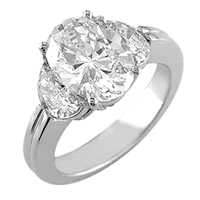
Oval Diamond
The oval diamond is actually an elongated brilliant cut diamond and is traditionally set with two smaller diamonds flanking the center diamond on either side. Although the oval diamond is not as popular as a stand alone diamond in a solitaire engagement ring, it is very sought-after in a three-stone diamond engagement ring. When the oval diamond is cut well, it has tremendous brilliance and fire.
Because of its elongated shape and curvature, it is considered a very classical and elegant diamond. The type of setting you choose for your oval-shaped diamond will greatly impact the impression it gives. Choosing a pave diamond ring for your oval diamond, or smaller flanking diamonds will greatly enhance the overall look.
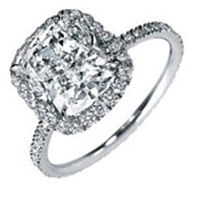
Cushion Diamonds
A cushion diamond gets its name from the aesthetic appearance of the stone. The cushion diamond is often crafted for maximum weight retention and is considered an excellent choice when set in a micro pave diamond or halo diamond engagement ring setting. Because the cushion diamond usually appears larger than its actual weight, it is an ideal diamond choice for many who would like the look of a larger diamond at a better diamond value.
Cushion diamonds are extremely beautiful when used and incorporated in lavish diamond engagement rings, like antique or vintage diamond wedding rings. Designer jewelry companies will often showcase their dazzling and expensive diamond jewelry set with cushion diamond of all sizes.
The cushion diamond has garnered a tremendous fan club for its classy look and beauty in jewelry pieces and is considered to be one of today's "hot diamonds".
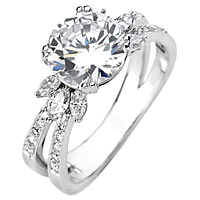
Round Brilliant Diamond
The round diamond is the most traditional and popular of all diamond shapes. Approximately 80 percent of all loose diamonds being sold in the marketplace are round diamonds. A round diamond has a total of 58 facets, 33 on the top portion called the crown and 25 facets on the bottom called the pavilion. A round diamond that is cut to ideal cut diamond parameters will be the most beautiful and brilliant of all the diamond shapes. It is for this reason that round diamonds are most often set in solitaire, four-prong engagement ring settings to showcase their brilliance. The round diamond has evolved tremendously over the years and has rightfully earned its place today as the most desired and sought after of all of the diamond cuts. At Milanj, we offer the pinnacle in round diamond perfection with our featured Hearts and Arrows Diamonds. We also carry an amazing selection of the finest round ideal diamonds available today.
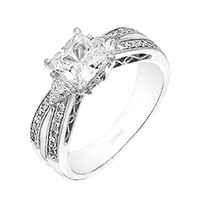
Princess Diamonds
The princess diamond is the second most popular diamond shape after the round diamond. Traditionally, the princess diamond has been a diamond shape that does not allow for maximum beauty and brilliance. This is partially due to its four corners which will allow too much light to leak out of the diamond instead of being directed back to the eye in the form of brilliance. Many diamond companies and manufacturers have attempted to combat this by creating modified square diamonds with tapered edges. The problem with this approach is the fact that it destroys the beauty and elegance that has always been associated with a true square diamond. It is for this reason that we decided to create the perfect princess diamond, focusing on maximizing the diamonds brilliance without deviating from the traditional square diamond shape. We have accomplished this with our Signature Princess Diamonds.
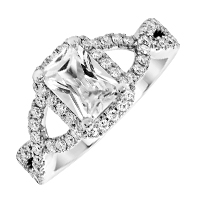
Emerald Diamond
The emerald diamond, (cut similarly to a precious emerald gemstone) also known as a step cut diamond (for the way it resembles a set of steps) has fewer facets than the more popular round diamond. The diamond is rectangular or square in shape with tapered corners. While the round diamond has 58 facets, the emerald has only 25. Because the light entering into the diamond has fewer surfaces from which to reflect light, there is noticeably less fire in emerald diamonds. As a direct consequence, inclusions within the emerald diamond as well as lower color grades will be much more visible to the naked eye. It is therefore important to consider a higher color and clarity grade when purchasing an emerald diamond.
By now you must be asking yourself why you might even consider an emerald diamond engagement ring.
Well, the truth is that the emerald diamond, while not as fiery as other diamonds, is exceptionally sophisticated and very desirable. Unlike many other fancy shaped diamonds which look somewhat similar, the emerald diamond has a unique style.
Women who prefer the emerald diamond are not really looking for a diamond that will blow people away with maximum brilliance and fire. Rather, they are looking to make a clear statement about their creativity and individuality. In this capacity the sleek and beautiful look of this popular heirloom diamond cannot be duplicated.
The emerald diamond ring today has become increasingly popular with celebrities and the fashion elite.
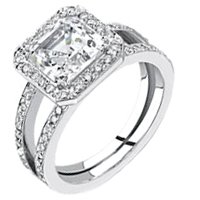
Asscher Diamond
The Asscher diamond is a kind of derivative of the emerald diamond in a square shape with a total depth that is typically greater than the modern emerald diamond. The cut is named for Joseph Asscher, founder of the Royal Asscher Company, established in Amsterdam in 1854. A master diamond cutter of world repute, Joseph created his Asscher in 1902. His unique diamond cut became an instant sensation and was incredibly popular for many years. Even though it is very rare to find an original Asscher diamond today, some were passed down from generation to generation and are purchased as estate jewelry pieces.
Asscher is also known the world over for being the cutter of the world's largest (known) diamond; the 3,205 carat Cullinan Diamond. Asscher was commissioned by British King Edward VII with the cutting and faceting of this large diamond. The project took him approximately 6 months where he did nothing but study and analyze the diamond rough to determine how best to cut the stone. Ultimately, Asscher created 3 individual and perfectly flawless diamonds from the rough; all of them famous.
The revival of this kind of art deco style diamond jewelry has been the catalyst to bring the Asscher diamond back to the forefront of today's diamond buying public.
A unique aspect of the Asscher diamond is that there are no set proportions or "numbers" with which to cut the diamond. This diamond does have a basic square outline and step facets, but that is it. The diamond cutter will craft each Asscher diamond with the intent to maximize light performance and beauty. The result is a diamond of incredible beauty and timeless appeal.
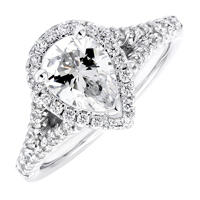
Pear Shape Diamonds
"Teardrop of the Gods", the pear shape diamond is considered an exquisite diamond for use in quality jewelry and designer engagement rings. The pear shape diamond is exceptionally beautiful and elegant and can be set in a solitaire engagement ring or even a diamond ring with side stones.
The pear shaped diamond is essentially a fusion of the marquise and oval diamonds, combining the "best of both worlds". You get the beautiful rounded edge on top of the diamond, as well as the distinctive taper on the bottom. A pear shape diamond engagement ring is an assertion of impeccable taste and refinement.
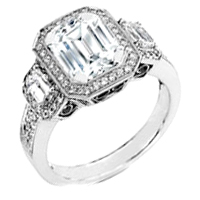
Radiant Diamonds
A cross between a round and emerald diamond, the radiant diamond can be quite beautiful and brilliant. The radiant diamond is typically comprised of 70 facets and is either square or rectangular in shape. Although its popularity has somewhat faded over time, finely cut radiant diamond engagement rings have recently become popular again.
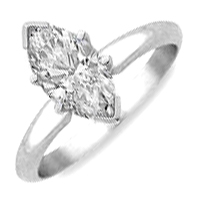
Marquise Diamond
Of all the fancy diamond shapes, the marquise diamond is the diamond of choice for royalty and is quite possibly the most regal and elegant of them all. The diamonds elongated shape makes the fingers appear longer. The unique structure of the marquise diamond makes it approximately twice as long as it is wide, with beautiful tapered points on each end. The shape and structure of the diamond will make it appear larger than what it actually weighs in carats. This is due to the large surface area of the stone. Therefore, you can actually a purchase a smaller marquise diamond engagement ring than you would in a different diamond shape, and have it appear significantly larger to the eye.
An important consideration with a marquise diamond is the length to width ratio of the stone. This will determine how brilliant and sparkly the diamond will appear to your eye. If a marquise diamond is cut properly, it will have excellent brilliance. Otherwise, it will exhibit a "bow-tie" effect in the center of the stone where you will see a dark black (bow-tie) area with an obvious lack of brilliance.
The ideal length to width ratio for a marquise diamond is considered to be 1.8: - 1 or 2:1.
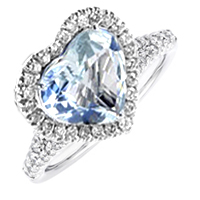
Heart Shape Diamond
One of the most delightful of all diamond shapes, the heart shape diamond hides its true complexity behind a veneer of romance. Heart shaped diamonds are actually pear shaped diamonds with a distinctive cleft on top instead of the rounded edges.
It is incredibly difficult to cut a piece of diamond rough into a beautiful (polished) heart shape diamond. It requires a great degree of skill and even one mistake on the part of the diamond cutter will make the difference between a visually stunning vs. a lifeless diamond.
Like pear shaped diamonds, the specific length or width of the heart diamond can change. However, in order for a heart shaped diamond ring to be valuable, it must exhibit proper symmetry. This means that the diameter across its widest perimeter (known as the "shoulders" of the heart) should be equal to its length. The way to measure the length is by running a vertical line from the cleft to the tip of the diamond.
The heart shaped diamond both promotes the notion of individual romance and is also gauged for beauty and brilliance in a much more personal and subjective way.